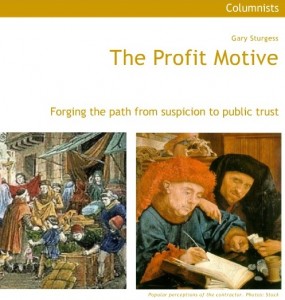Perhaps it would help to avoid the colonial allusions:
That amusingly counterproductive headline appeared in the latest issue of the Journal of Intersrnational Peace Operations, a hopeless PR exercise published by the International Peace Stability Operations Association, a tax-exempt lobbying outfit for private security companies. (Last year, members voted to change “peace” to “stability” in the association’s name, in order “to better represent the broad mission and clientele of the industry as a whole.”)
The peace ops journal lacks the gravitas of Foreign Affairs or the pulp appeal of Soldier of Fortune Magazine, but it does offer some accidental moments of insight.
 For instance, the new issue includes an article titled, “The Profit Motive: Forging the path from suspicion to public trust.” It begins by noting that public mistrust of government contractors runs back in time at least as far as the Roman Empire.
For instance, the new issue includes an article titled, “The Profit Motive: Forging the path from suspicion to public trust.” It begins by noting that public mistrust of government contractors runs back in time at least as far as the Roman Empire.
What explains this deep suspicion of profit-making from public services? In large part is arises from concerns about mercenary motives.
Time and again through history, such concerns have proved well-founded, particularly in regards to actual mercenaries such as the members of the ISOA. But never mind the facts. The association’s goal is to manage perceptions.
Still, are there things that might be done to reduce these concerns? The most obvious response…is that if contractors are rich, “this is not the fault of the system, but of the conditions of the bargain made with them,” i.e. the government needs to be a smarter customer.
Imagine the outrage if a retail store adopted this public relations strategy: “Sure, we charged you double—but it’s your fault that you didn’t bother to look for a better deal.”
This passage amounts to an admission that what motivates the contractors is not the public good, but their own personal gain. In other words, the author’s “obvious response” to widespread public suspicion demonstrates that “concerns about mercenary motives” are entirely justified.
To his limited credit, the author concludes by suggesting that the public would be more inclined to trust established, reliable companies that accept “reasonable returns” and encourage competitive bidding. He doesn’t come right out and say, “stop acting like greedy, unscrupulous cowboys,” presumably because to put it so plainly might be taken as a rejection of the business model. [visitor]
**WHAT CAN YOU FIND OUT ABOUT ISOA MEMBER TRIPLE CANOPY?
JOIN THE INVESTIGATION.
[gravityform id=6 title=false description=false ajax=true field_values=‘Registered=No&compname=Triple%20Canopy’]
**
[/visitor]
It’s not like ISOA members would take such advice, anyway. The organization recently lobbied against a provision in a bill that would’ve required that “price to the federal government be given at least equal importance” as other criteria in evaluating defense contract proposals. Stupid government! Why isn’t it a smarter customer?
 Anyway, that’s as close as the peace ops journal gets to genuine self-reflection. Most of its articles share the deluded, defensive tone of the farewell letter of former ISOA director J.J. Messner, in which he reflected on the industry’s changing image.
Anyway, that’s as close as the peace ops journal gets to genuine self-reflection. Most of its articles share the deluded, defensive tone of the farewell letter of former ISOA director J.J. Messner, in which he reflected on the industry’s changing image.
Take the word “mercenary” for example. Despite the legal inaccuracies in applying the term to private contractors — and the fact that it is just plain derogatory — it was nevertheless the favorite descriptor among many industry commentators… Fast-forward five years and pretty much no serious journalist uses the term. Indeed, it has become a term used nearly exclusively by the sensationalist fringe.
The point here is that under Messner’s tenure, the ISOA succeeded in bullying news editors into substituting a bulky euphemism, “private security contractors,” for the more concise and accurate term, “mercenaries.” What “serious journalist” wants to be counted among the “sensationalist fringe” by a glorified flack whose wife worked at the Washington Post? Or worse, to get a scary-sounding email demanding correction of a “legal inaccurac[y]”? (That kind of aggressive PR is part of the reason why many news organizations still freely use the offending term only when describing “private security contractors” from another country.)
Messner is merely patting himself on the back for a job well done. And why not? Judging from his current Facebook profile photo, it looks like he’s enjoying a well-deserved break from the stressful work of going on television to defend a misunderstood minority of business-owners who just happen to be well-armed multimillionaires.
Yeah, it would be a shame if people got the idea that the private security business was all about making money.

